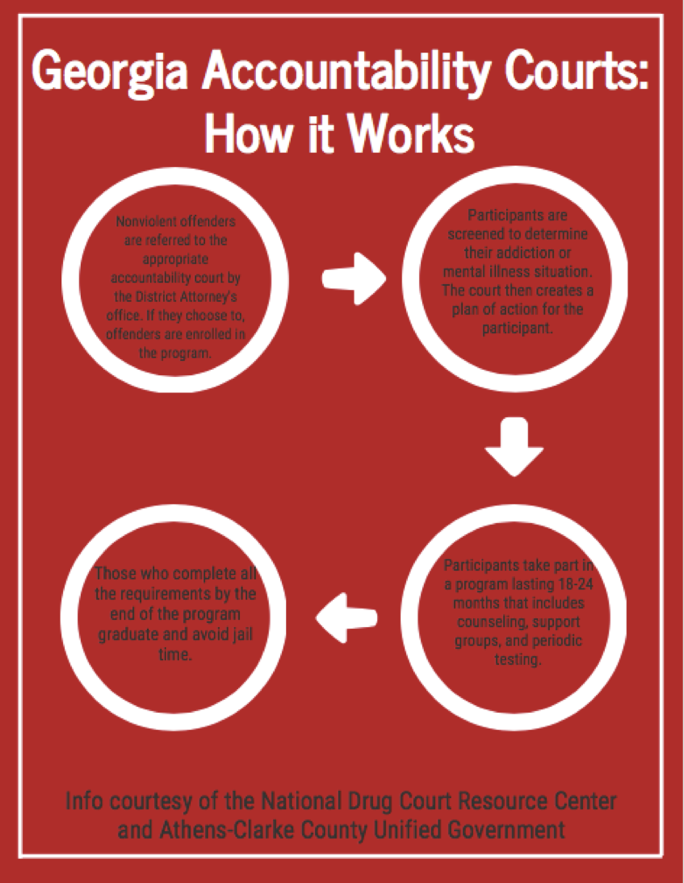By Alex Soderstrom
As a new president settles into the White House, the future of criminal justice reform is up in the air. While President Donald Trump has labeled himself a pragmatic dealmaker willing to look into a variety of alternatives to reduce crime, his pick to lead the Justice Department, Alabama Senator Jeff Sessions, has voted against criminal justice initiatives such as sentence reform as recently as 2016.
Meanwhile, the United States has the world’s largest prison population, and states are spending more than $39 billion of combined taxpayer money on corrections.
The good news is that individual states have the ability to lead the charge to reduce prison populations and corrections spending regardless of what actions the Justice Department takes during the Trump Administration. To accomplish that feat, states should look to the example of Georgia’s accountability courts, a successful experiment that could benefit the corrections systems of states across the nation. Accountability courts treat nonviolent offenders who suffer from mental illness, addiction, or other health issues not with prison time, but rather with monitoring and counseling to actually heal them instead of locking them up and forgetting about them until their time is served.
At the heart of America’s bloated prison population is its recidivism rate – how often individuals go back to jail or prison after being released. A large-scale study by the Bureau of Justice Statistics revealed that around two-thirds of individuals released from prison or jail were rearrested within three years. Obviously, the goal for the corrections system should be to find a way to keep individuals out of prison after their first arrest.
The reason so many former inmates find themselves back behind bars so quickly is because prisons have become filled with the addicted and mentally ill. More than half of American inmates have a substance abuse issue, and approximately 50 percent of those in jail have some sort of mental illness. These issues cannot be fixed with time spent behind bars; they require a more patient, more intelligent approach.
The first accountability court in Georgia was created in 1994, but the approach has truly expanded across the state under the leadership of current Georgia Governor Nathan Deal, who has quintupled the program’s funding. The courts operate under the authority of judges who oversee nonviolent offenders who willingly enter the program and pursue a goal of alleviating Georgia’s prisons of addicted and mentally ill inmates who cost taxpayers more than $21,000 a year per inmate.

The program has been a immense success: the recidivism rate is 20 percent for Georgians who complete mental health court and only 7 percent for individuals who go through drug courts in the Peach State. All of this is done on a budget: costs per participant average $3,000 a year – a mere fraction of what the state pays to keep individuals incarcerated.
These statistics sum up what is so attractive about the work Georgia has been doing and why it has the potential to be a national model. Accountability courts are able to generally satisfy both social liberals and fiscal conservatives with their emphasis on treatment over punishment and the ability to drastically cut government spending.
These types of court programs are not unique to Georgia. Every state in the country has some form of accountability courts, known in some states as problem solving courts. Though, few utilize them to the extent of the Peach State. Georgia ranks sixth in the nation with 93 such courts. On the other hand, states like Mississippi, the fifth-largest incarcerator in the country, has only 42, including just one mental health court. Louisiana, which has the largest incarnation rate in the nation, has only two mental health courts in the state.
States can do so much better for the hundreds of thousands of inmates with addiction or mental health issues and the taxpayers who entrust them to spend their money effectively in treating crime. They can pursue a model, as Georgia is doing, that treats the underlying sources of crime and gives individuals a chance to take control of their lives.
Debate over criminal justice reform has traditionally centered around the idea of policies wither being soft or hard on crime. However, accountability courts give states the opportunity to be intelligent on crime.


